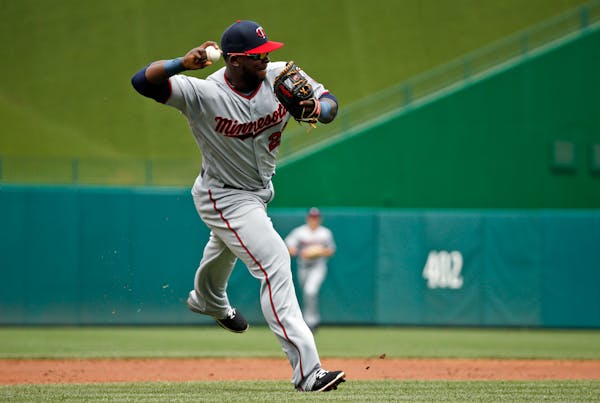Byung Ho Park watched a Cody Anderson four-seamer blaze past at 94 mph during the second inning Tuesday night, and got a read on its speed. After watching a curveball spin too low, he waited for the 1-1 pitch. Another fastball, virtually identical to the first, and Park was ready: He whipped his bat into the pitch and drove it deep to right-center field, arriving at second base with a leadoff double.
A few minutes later, Park scored on a Kurt Suzuki single to give the Twins a 2-1 lead. It was a good sequence for the offense-challenged Twins, but also represented a minor milestone for the 29-year-old Korean: his first major league hit off an extreme-velocity pitch, something that's becoming more common every year in Major League Baseball.
Most scouting reports on Park, as he left South Korea to sign with the Twins last winter, noted his extraordinary power, his impressive bat speed — and his inexperience against pitchers who throw in the mid-90s and above. Few pitchers in the Korea Baseball Organization, where Park hit 104 homers over the past two seasons, can hurl a fastball more than 90 mph.
So how is the transition to MLB levels of speed going? Well, it's been a predictably slow start, but the Twins are heartened by their rookie's progress.
"I don't know if I'd comment specifically on how he's handling hard stuff — it's just that I see steady improvement, whether it's on fastballs or breaking balls," manager Paul Molitor said. "We've seen him hammer breaking-ball mistakes, but he hit a fastball away for a no-doubter [home run] to right field [on April 18]. He's pulled some good fastballs."
Park has left little doubt that he can crush slower-speed breaking balls that hang in the strike zone. The South Korean leads the Twins with five home runs, including a couple that traveled more than 440 feet, and three of them came on sliders or curves traveling less than 80 mph. Wednesday's cannon shot that pulled the Twins within a run of the Indians was off an 84-mph cutter. Only that opposite-field blast off Chase Anderson, the homer that particularly impressed Molitor, came on a fastball, timed at 90 mph.
"Not necessarily am I trying to hit home runs off a hard fastball. It's all about timing," Park said through an interpreter. "Once you reach it, you can't control where it goes. So I work on my timing as much as I can against the 95 mph fastballs. I would say I feel comfortable now."
Probably even better after Tuesday's double. According to MLB's pitchf/x data, Park has faced 60 pitches of extreme velocity (93 mph and above) this season. Of those, he has taken 16 for balls, 11 for strikes, and fouled off 17. He has swung and missed at only six. But of the 10 hard fastballs he has put into play, only that double off Anderson fell in for a hit.
By contrast, teammate Brian Dozier, even with a batting average of only .207, leads the majors in hits against 93 mph-plus fastballs, with nine. Miguel Sano owns seven, Eduardo Escobar six, and every Twins position player had at least one before Park. But four of Park's 14 total hits have come on four-seam or two-seam fastballs timed at 90 or above.
"I think everyone is kind of learning he's a little bit of a guess guy. If he's looking to hit a good fastball, he's got the bat speed to do it," Molitor said. "He's jumped on breaking balls when he's gotten mistakes, too."
Park agrees with his manager's observation.
"I wouldn't say I'm a fastball hitter or a breaking-ball hitter, but more of my home runs [in South Korea] came on fastballs," Park said. "Not all, but some I was sitting on a breaking ball because of the situation and the pitcher. That has happened here, too."
